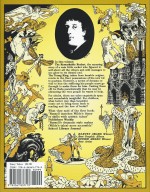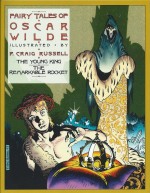

Adapted by P. Craig Russell & various (NBM)
ISBN: 978-1-56163-771-3
P. Craig Russell began his illustrious career in comics during the early 1970s and came to fame young with a groundbreaking run on science fiction adventure series Killraven, Warrior of the Worlds.
Although his fanciful, meticulous, classicist style was joyously derived from the great illustrators of Victorian and Edwardian heroic fantasy, and the craftsmanlike visual flourishes of Art Nouveau was greatly at odds with the sausage-factory deadlines and sensibilities of the mainstream comicbook industry, the sheer power and beauty of his work made him a huge draw.
By the 1980s he had largely retired from the merciless daily grind, preferring to work on his own projects (generally adapting operas and plays into sequential narratives) whilst undertaking the occasional high-profile Special for the majors – such as Dr. Strange Annual 1976 (totally reworked and re-released as Dr. Strange: What Is It that Disturbs You, Stephen? in 1996) or Batman: Robin 3000.
As the industry grew up and a fantasy boom began, he returned to comics with Marvel Graphic Novel: Elric (1982), further adapting prose tales of Michael Moorcock’s iconic sword-&-sorcery star in the magazine Epic Illustrated and elsewhere.
Russell’s stage-arts adaptations had begun appearing in 1978: first in the independent Star*Reach specials Night Music and Parsifal and then from 1984 at Eclipse Comics where the revived Night Music became an anthological series showcasing his earlier experimental adaptations; not just operatic dramas but also tales from Kipling’s Jungle Books and other literary classics.
In 1992 he began adapting the assorted Fairy Tales of Oscar Wilde – a mission he continues to date, and this second volume (now in its third printing) deftly balances a tale of magnificent, pious allegorical wonderment with a wry and hilarious concealed yet concerted attack on conceit and self-aggrandisement packed with examples of the devastating, so-quotable epigrams which made the author so briefly the most popular man in London Society…
The Young King was originally published in 1891, one of the quartet of stories in A House of Pomegranates, (Wilde’s second book of stories for children) and here adaptor Russell utilises all his skills to staggering effect.
When the old king falters, the grandson he refused to acknowledge (due to the scandal of a Princess’ forbidden liaison) is plucked from the obscurity of a shepherd’s croft and made heir to the kingdom.
At first the crude, impoverished lad is beguiled and besotted by the sheer beauty of the Court and his new Station, but as his coronation approaches and he sinks into idolatry over the impossible, incomprehensible fineness of his vestments and symbols of office, the bedazzled 16-year-old dreams three dreams.
In them he sees three visions of the toil, privation, hardship and, too frequently, deaths the common folk paid for his Crown, Robe and Sceptre, and something changes within him.
Discarding all his finery, he dons his shepherd rags, picks up his crook and places a circlet of briars upon his brow. Then walking to the Cathedral, he draws scorn, derision and worse from the townsfolk, soldiers and nobility who decry the ingrate seeking to bring shame to a proud kingdom…
The miraculous, messianic ending to this stunningly realised parable is ably counter-pointed by a somewhat jollier – if wickedly barbed – offering.
Rendered in a more animated and fantastical manner, The Remarkable Rocket appeared in Wilde’s original 1888 collection The Happy Prince and Other Tales and begins with the betrothal of a young Prince to an exotic Princess.
As part of the festivities, a huge banquet and Grand Ball was to be concluded with a spectacular fireworks display: a spectacle the intended bride had never before experienced.
As the preparations began, in the palace gardens the assorted Roman Candles, Catherine Wheels and other pyrotechnics began to discuss their upcoming big night, one particularly obnoxious rocket increasingly monopolizes the conversation. Pompous, self-important, supercilious and unconscionably rude, he brags so much and babbles so long that he reduces himself to tears and is so sodden that when the big moment comes he is utterly incapable of igniting and completely misses the show.
Damp and disconsolate, he is discarded and lies unspent and obstreperous in the gardens having learned nothing. When a frog, dragonfly and duck try to engage him in conversation, Rocket again reverts to his abominable manner but things are about to change as two common boys pick him up to chuck on their campfire…
Gloriously rife with razor-sharp Wildean bon mots and ferociously barbed social criticism, this clever yarn still holds one final ironic tweak in the tale…
The brace of brilliant adaptations in this award-winning (a Harvey for Best Graphic Album and an Eisner for Best Artist) book signalled another high point in the artist’s splendid career, and on first release in 1994 displayed another milestone in the long, slow transition of an American mass market medium into a genuine art form.
Most importantly this and the other volumes in the series are incredibly lovely and irresistibly readable examples of superb writing (so go and read Wilde’s original prose tomes too!) and sublime examples of comics art their very best.
Now that it’s finally back in print, you simply must avail yourself of this masterful confection…
© 1994 P. Craig Russell. All rights reserved.
